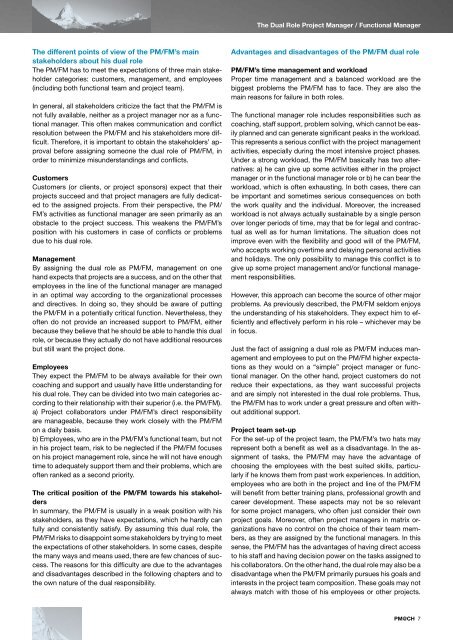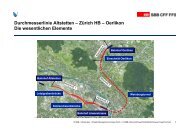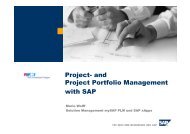The Dual Role Project Manager / Functional Manager - PMI ...
The Dual Role Project Manager / Functional Manager - PMI ...
The Dual Role Project Manager / Functional Manager - PMI ...
You also want an ePaper? Increase the reach of your titles
YUMPU automatically turns print PDFs into web optimized ePapers that Google loves.
<strong>The</strong> different points of view of the PM/FM’s main<br />
stakeholders about his dual role<br />
<strong>The</strong> PM/FM has to meet the expectations of three main stakeholder<br />
categories: customers, management, and employees<br />
(including both functional team and project team).<br />
In general, all stakeholders criticize the fact that the PM/FM is<br />
not fully available, neither as a project manager nor as a functional<br />
manager. This often makes communication and conflict<br />
resolution between the PM/FM and his stakeholders more difficult.<br />
<strong>The</strong>refore, it is important to obtain the stakeholders’ approval<br />
before assigning someone the dual role of PM/FM, in<br />
order to minimize misunderstandings and conflicts.<br />
Customers<br />
Customers (or clients, or project sponsors) expect that their<br />
projects succeed and that project managers are fully dedicated<br />
to the assigned projects. From their perspective, the PM/<br />
FM’s activities as functional manager are seen primarily as an<br />
obstacle to the project success. This weakens the PM/FM’s<br />
position with his customers in case of conflicts or problems<br />
due to his dual role.<br />
Management<br />
By assigning the dual role as PM/FM, management on one<br />
hand expects that projects are a success, and on the other that<br />
employees in the line of the functional manager are managed<br />
in an optimal way according to the organizational processes<br />
and directives. In doing so, they should be aware of putting<br />
the PM/FM in a potentially critical function. Nevertheless, they<br />
often do not provide an increased support to PM/FM, either<br />
because they believe that he should be able to handle this dual<br />
role, or because they actually do not have additional resources<br />
but still want the project done.<br />
Employees<br />
<strong>The</strong>y expect the PM/FM to be always available for their own<br />
coaching and support and usually have little understanding for<br />
his dual role. <strong>The</strong>y can be divided into two main categories according<br />
to their relationship with their superior (i.e. the PM/FM).<br />
a) <strong>Project</strong> collaborators under PM/FM’s direct responsibility<br />
are manageable, because they work closely with the PM/FM<br />
on a daily basis.<br />
b) Employees, who are in the PM/FM’s functional team, but not<br />
in his project team, risk to be neglected if the PM/FM focuses<br />
on his project management role, since he will not have enough<br />
time to adequately support them and their problems, which are<br />
often ranked as a second priority.<br />
<strong>The</strong> critical position of the PM/FM towards his stakeholders<br />
In summary, the PM/FM is usually in a weak position with his<br />
stakeholders, as they have expectations, which he hardly can<br />
fully and consistently satisfy. By assuming this dual role, the<br />
PM/FM risks to disappoint some stakeholders by trying to meet<br />
the expectations of other stakeholders. In some cases, despite<br />
the many ways and means used, there are few chances of success.<br />
<strong>The</strong> reasons for this difficulty are due to the advantages<br />
and disadvantages described in the following chapters and to<br />
the own nature of the dual responsibility.<br />
<strong>The</strong> <strong>Dual</strong> <strong>Role</strong> <strong>Project</strong> <strong>Manager</strong> / <strong>Functional</strong> <strong>Manager</strong><br />
Advantages and disadvantages of the PM/FM dual role<br />
PM/FM’s time management and workload<br />
Proper time management and a balanced workload are the<br />
biggest problems the PM/FM has to face. <strong>The</strong>y are also the<br />
main reasons for failure in both roles.<br />
<strong>The</strong> functional manager role includes responsibilities such as<br />
coaching, staff support, problem solving, which cannot be easily<br />
planned and can generate significant peaks in the workload.<br />
This represents a serious conflict with the project management<br />
activities, especially during the most intensive project phases.<br />
Under a strong workload, the PM/FM basically has two alternatives:<br />
a) he can give up some activities either in the project<br />
manager or in the functional manager role or b) he can bear the<br />
workload, which is often exhausting. In both cases, there can<br />
be important and sometimes serious consequences on both<br />
the work quality and the individual. Moreover, the increased<br />
workload is not always actually sustainable by a single person<br />
over longer periods of time, may that be for legal and contractual<br />
as well as for human limitations. <strong>The</strong> situation does not<br />
improve even with the flexibility and good will of the PM/FM,<br />
who accepts working overtime and delaying personal activities<br />
and holidays. <strong>The</strong> only possibility to manage this conflict is to<br />
give up some project management and/or functional management<br />
responsibilities.<br />
However, this approach can become the source of other major<br />
problems. As previously described, the PM/FM seldom enjoys<br />
the understanding of his stakeholders. <strong>The</strong>y expect him to efficiently<br />
and effectively perform in his role – whichever may be<br />
in focus.<br />
Just the fact of assigning a dual role as PM/FM induces management<br />
and employees to put on the PM/FM higher expectations<br />
as they would on a “simple” project manager or functional<br />
manager. On the other hand, project customers do not<br />
reduce their expectations, as they want successful projects<br />
and are simply not interested in the dual role problems. Thus,<br />
the PM/FM has to work under a great pressure and often without<br />
additional support.<br />
<strong>Project</strong> team set-up<br />
For the set-up of the project team, the PM/FM’s two hats may<br />
represent both a benefit as well as a disadvantage. In the assignment<br />
of tasks, the PM/FM may have the advantage of<br />
choosing the employees with the best suited skills, particularly<br />
if he knows them from past work experiences. In addition,<br />
employees who are both in the project and line of the PM/FM<br />
will benefit from better training plans, professional growth and<br />
career development. <strong>The</strong>se aspects may not be so relevant<br />
for some project managers, who often just consider their own<br />
project goals. Moreover, often project managers in matrix organizations<br />
have no control on the choice of their team members,<br />
as they are assigned by the functional managers. In this<br />
sense, the PM/FM has the advantages of having direct access<br />
to his staff and having decision power on the tasks assigned to<br />
his collaborators. On the other hand, the dual role may also be a<br />
disadvantage when the PM/FM primarily pursues his goals and<br />
interests in the project team composition. <strong>The</strong>se goals may not<br />
always match with those of his employees or other projects.<br />
PM@CH 7




